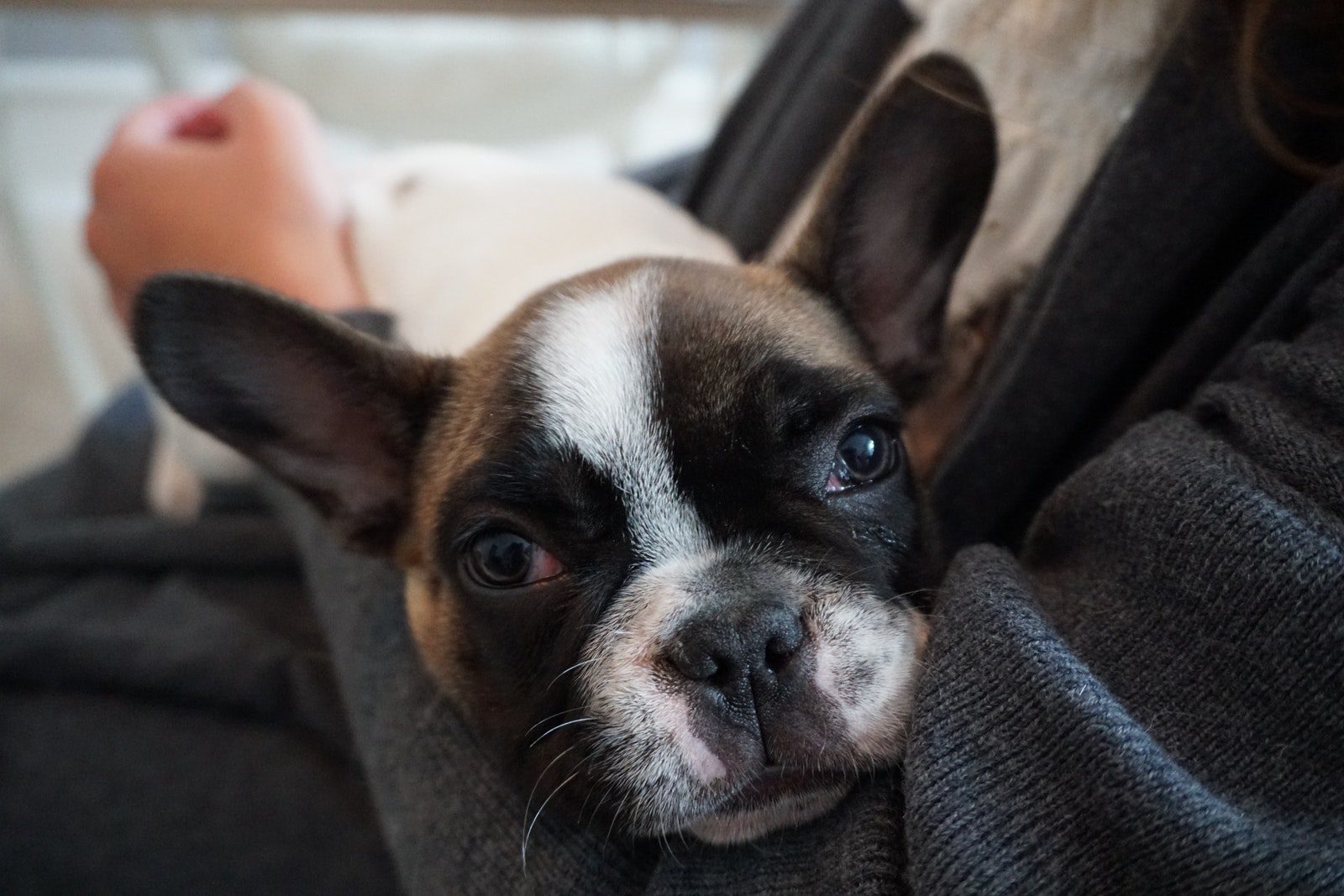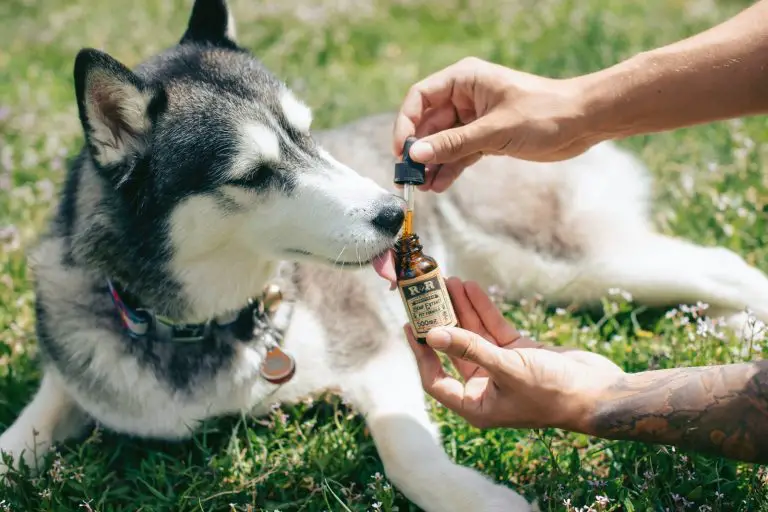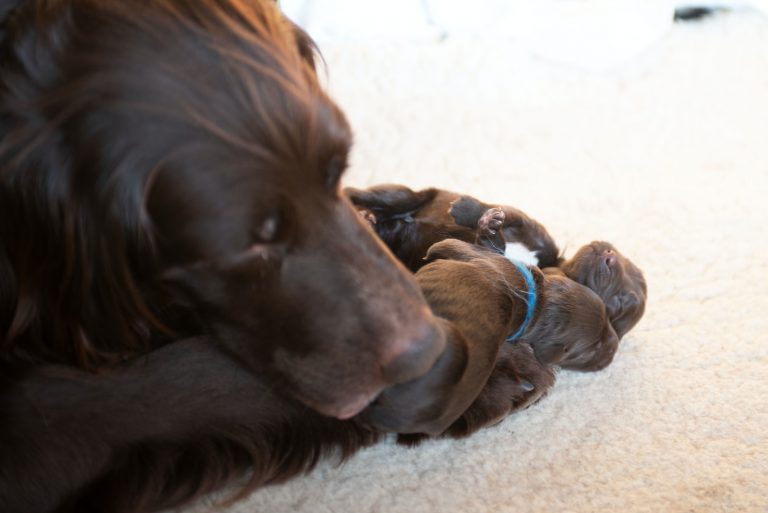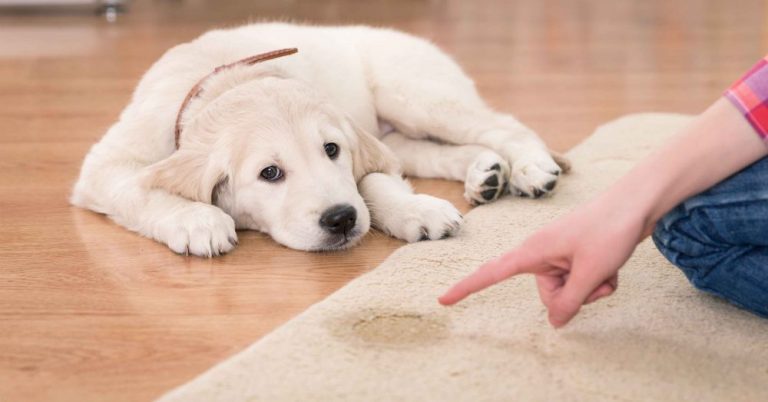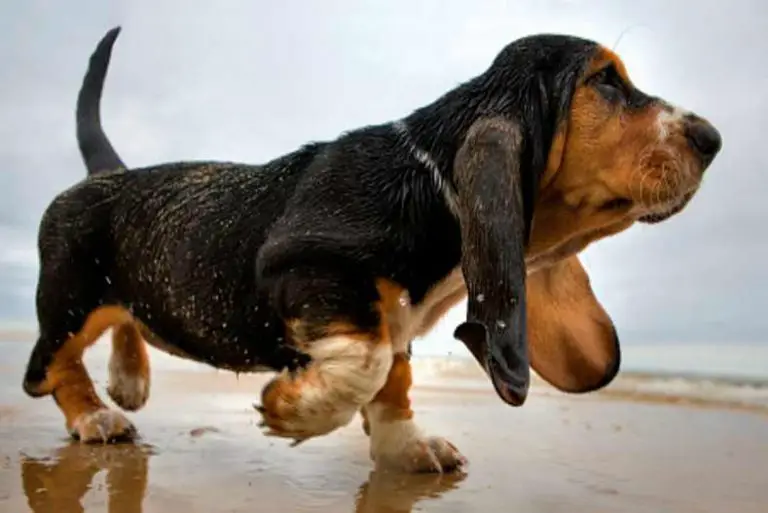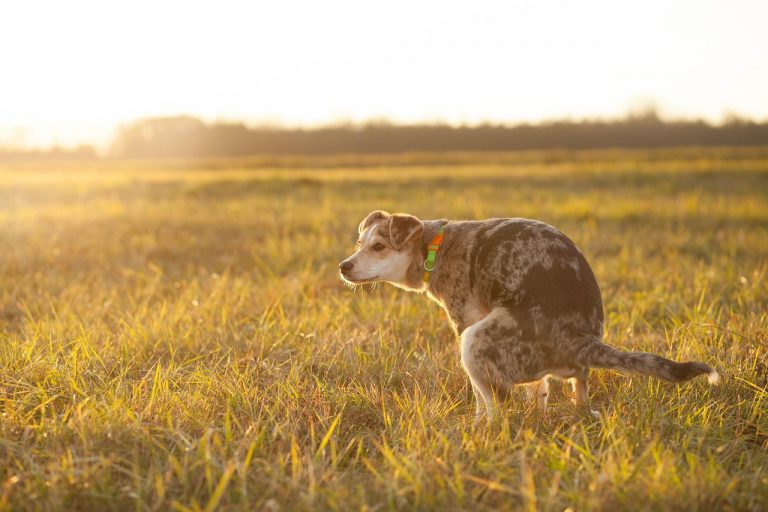Bad breath or halitosis becomes concerning when your puppy breath smells like fish, which is downright off-putting.
Fish breath may be caused by several reasons, including behavioral and health issues. That said, the most common of these is teething in young pups. As the old teeth move out of place, they leave behind space, which is then filled up by bacteria.
Bad breath in adult dogs is commonly due to poor dental hygiene, which, if not treated, could lead to periodontal diseases and the eventual loss of teeth.
Chances are, you stumbled upon across article because you typed, “puppy breath smells like fish.” If that is the case, you’re probably in need of a more fleshed out answer and solutions for your puppy’s bad breath.
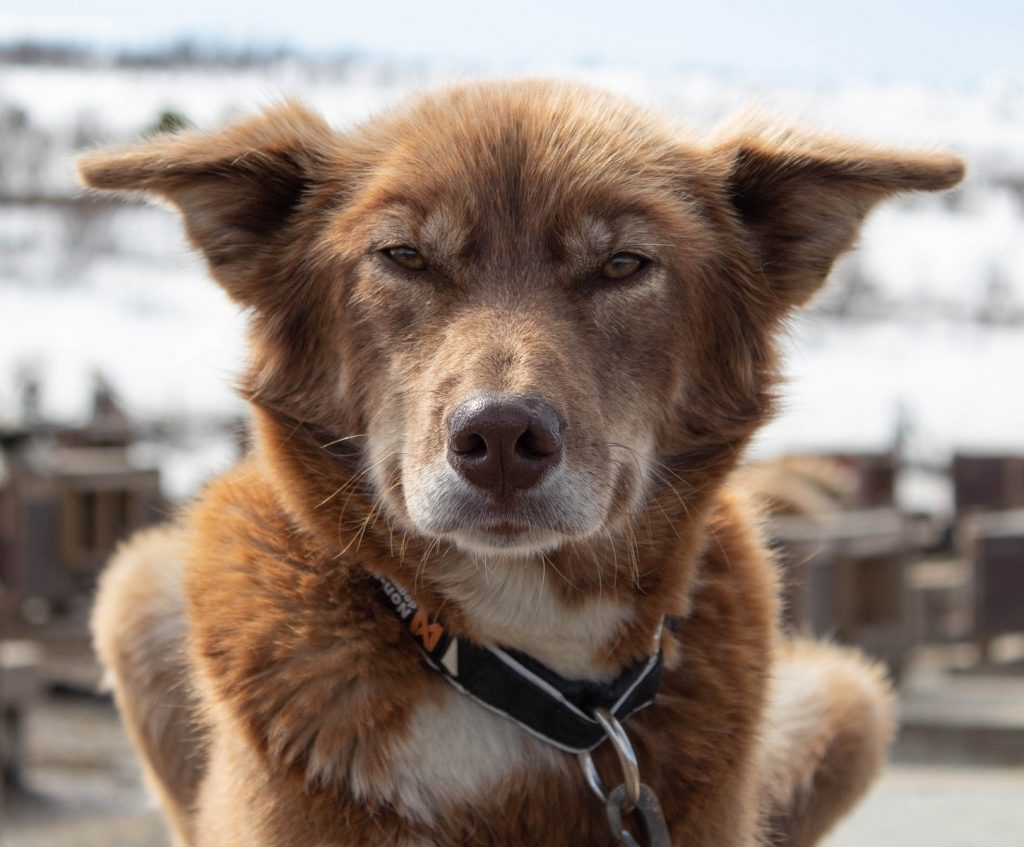
13 Most Common Reasons Why Your Dog Has Fishy Breath
Read on to unravel the 13 most common reasons why puppy breath smells like fish and their possible solutions. Be sure to check this cool infographic on this topic.
Like humans, young pups have baby teeth that are gradually replaced by permanent teeth. The teething process usually starts when they are about two weeks old and ends when they’re eight months old. This is when their teeth are fully formed and replaced by 42 permanent teeth.
The ‘old’ teeth in pups are often small and very sharp – which most dog owners can testify all too well if they’ve been on the receiving end of a bite. It’s why they love chewing on tiny items that they can fit into their jaws, which also leads to a host of problems later on.
Bad breath doesn’t always stem from dental disease. In some cases, the reason could be coprophagia. Mother dogs with pups will eat stool in their immediate proximity, which is a reasonably normal cleaning behavior. Although they’re eating poop purely for cleaning purposes, mother dogs end up passing this trait to their pups who continue to eat dog poop. They usually grow out of this habit.
For obvious reasons, coprophagia adversely impacts their breath. So, if your dog has been eating feces ( whether it’s their own or that of other animals), they won’t be smelling like a bed of roses. As their owner, you should do all you can to prevent them from eating their poop.
For instance, you should supervise your dog whenever they go outside and leave their poop behind. If they pass stool indoors, make sure to pick it up immediately. Leaving poop out for more extended periods only tempts your dog to ingest it.
If you’re going on walks with your dog, make sure to put them on a leash and don’t be afraid to pull at it when they show interest at the sight of nearby feces.
Some dogs can have bad breath because of certain dietary choices they make. They may get fish burps after eating fish oil supplements. If you believe that your dog’s food is causing bad fishy breath, try switching their food or food brand to see if the bad breath goes away. If changing their diet doesn’t show immediate results, then your dog is probably dealing with a different issue entirely.
Fluid and poop buildup is a real issue that almost every dog has to deal with. Their only coping mechanism is to scoot along the carpet to wipe their butt. This later develops into a behavioral issue as they start sniffing and licking another animal’s butts. Fluids will occasionally accumulate around the sacs, and your dog will need help in releasing these fluids.
It is up to you to clear out the anal glands once and occasionally empty them once they get clogged.
If you’re not comfortable with the idea of tinkering around with your dog’s anal sacs, then make sure to set up an appointment with a trained professional or your vet. The cost of getting professional help isn’t very high and small compared to the long-term damage you and your dog are exposed to.
That being said, you can clean the anal sacs yourself, here’s a nice little tutorial video to help you get started (it’s a bit graphic though!).
If your dog has a chronic anal gland infection and none of your solutions work, your vet may have to remove the gland surgically. This option should only be exercised as a last resort when nothing else works.
Another reason for the fish odor is diabetes. If your dog has diabetes, you may notice he’s urinating and drinking a lot more, and sometimes spoils himself around the house. Other symptoms of diabetes include an increase in appetite, loss of weight, as well as behavioral changes such as lethargy and irritability, more so than usual. If you feel that these symptoms have gone out of hand, consider going to your vet for a urine and blood test.
Dogs with exceptionally foul, fishy breath may have symptoms of liver problems. If your dog shows symptoms such as increased vomiting, loss of appetite, and develops a yellowish color in his eyes and gums, you’re probably looking at the earliest signs of liver disease. Make sure to check in with the vet to learn more.
Bad breath also stems from the buildup of bacteria that produce odor. This could be due to chronic inflammation or infections in the nose that can lead to bad breath. Most puppies are inquisitive creatures, which means that they often test new things out by licking or chewing them.
Chances are, your puppy has already eaten detergent pods, chemicals, and soaps. These agents can lead to infections that cause bad breath in dogs.
Similarly, many dogs end up getting an infection after a bad fight with other animals, often leading to oral infections from wounds. Small puncture wounds from canine teeth can close over rapidly and be easily missed. Make sure to thoroughly examine your dog for obvious bite wounds and seek immediate veterinary attention if needed.
Canines are affected by several respiratory infections, some of which are possibly deadly. The most common respiratory infections are caused by adenovirus, influenza, and distemper, among others. These viruses are extremely contagious, and if you’re in a closed environment, such as office spaces or shelters, they could spread like wildfire.
Upper respiratory tract infections can lead to foul-smelling breath, which becomes more pronounced when your dog exhales or coughs. Treating upper respiratory tract infections can be challenging because it isn’t uncommon for dogs to relapse.
In the worst-case scenarios, some parasites can cause upper respiratory tract infections in dogs that will leave your pup open to a secondary infection. In this case, bad breath is a visible sign that now is the perfect time to take your pup to a vet.
The bones of pups are often fragile and weak, which is why they are particularly vulnerable to breaking and splintering, both of which can cause trauma to their oral tissues. It is common for these bone fragments to become lodged in narrow crevices found in the mouth, all of which can lead to trauma to the tissues, which leads to an infection and bad breath.
Being the hyper-curious creatures that they are, dogs will often come across ‘interesting’ items and gobble them up. For the most part, their well-equipped digestive systems eject this object in stool or vomit. But occasionally, these foreign items will get lodged in their intestinal tract, which then becomes the cause of bad breath.
Oral ulcers lead to bad breath and are often a precursor to more serious problems such as autoimmune diseases. Worse still is the fact that most pets won’t show obvious signs of oral ulcers until the mass has grown long enough to interfere with regular swallowing and chewing finally.
This is often followed by bad breath and oral discharge with blood on it. It is important to take your dog right away to the vet to identify possible tumors. In most cases, the tumor will be removed and sent to the laboratory for further examination.
Dogs often accumulate pockets of pus that form in their teeth due to an infection. These are also known as tooth abscesses. This often happens when your dog’s teeth break down as they try to chew on food.
Abscessed teeth can result in excessive drooling and can affect your dog’s diet. The most obvious sign of a tooth abscess is bad breath. It is worth noting that a sterile abscess can develop without any visible breaks in the skin, so make sure to pay attention when evaluating your dog.
Periodontal disease may lead to fish breath. It typically happens when food particles accumulate along the gum line, which creates the perfect conditions for bacteria and plaque to thrive. If left untreated, they can lead to reddening of the gums and possible inflammation, a condition known as gingivitis.
It is also possible for plaque to harden into a substance known as calculus, which can cause a separation of the gums from the teeth. This is when your vet will commonly diagnose your dog with periodontal disease. If not treated early, periodontal disease will lead to bone loss, loss of tissue, and more ongoing severe problems.
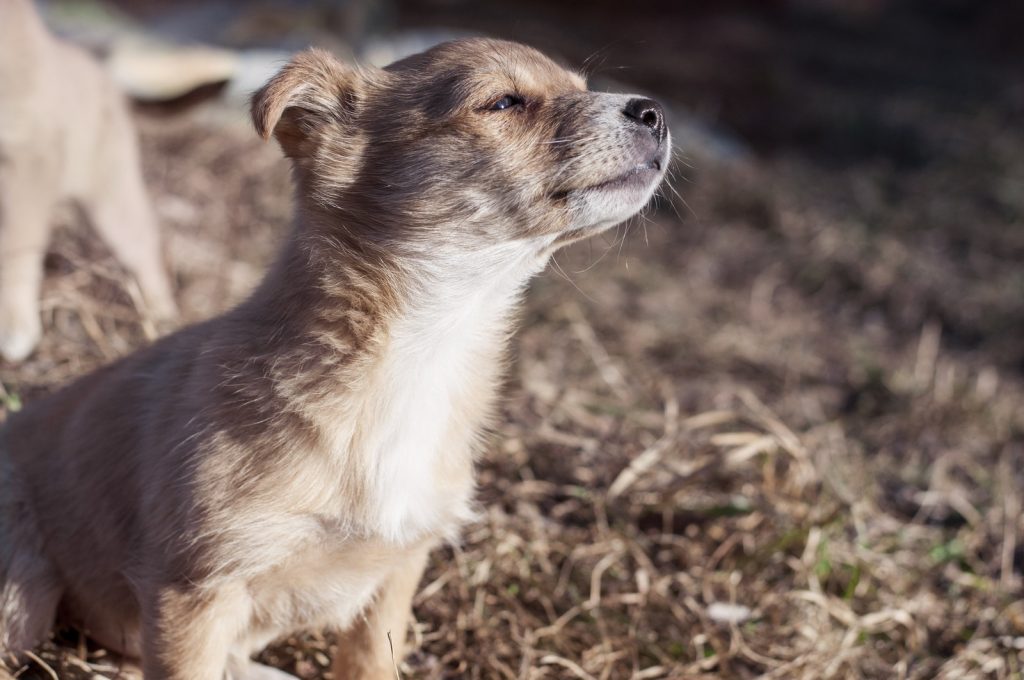
How to Prevent Fishy Breath in Dogs?
If puppy breath smells like fish, then you got to do something about it. Here are 8 things you can do stop your dog or puppy from having a fishy breath.
You probably saw this tip coming from a mile away. Bad dog breath can be fixed by brushing your dog’s teeth and gums regularly. If not every day, then you should brush your dog’s teeth at least once a week. This is true in the case of toy breeds with pushed-in faces such as puppies of the Brachy breed. In this case, we recommend brushing their teeth every day.
This is because the conformation of their tiny mouth makes them extra vulnerable to tooth decay. If your dog resists, toss in a few delicious treats, so they associate this pattern with fun and games. Make sure to use a toothpaste that your dog will like; this will make them hate their oral hygiene routine less.
Providing your dog with ample exercise and feeding them a well-balanced diet is a surefire way of preventing health disorders that could cause fish breath. The level of activity your dog needs is dependent on their breed. Highly energetic breeds such as Belgian Malinois and Border Collies need more intensive training than breeds like basset hounds and bulldogs.
All exercises should be selected based on your dog’s current medical condition. If they have an underlying health issue such as respiratory issues or heart problems, it’s best to talk with your vet for an appropriate exercise routine that will help them stay healthy.
A balanced diet promotes a healthy bowel movement, which effectively helps your dog’s anal glands perform correctly. Watery poop indicates a lack of pressure being placed on the anal glands to drain correctly. This also applies to the volume of the stool. Lesser poop is an indication of low pressure being placed on the anal glands.
The recommended diet for most dogs comprises a hearty dose of raw or cooked fish, meat, rice, and vegetables. As a general rule, your dogs should be lean and filled with energy instead of being obese and lethargic. More importantly, you should avoid the marketing hype that currently surrounds so many shelf-stable foods.
These foods have no live enzymes because they undergo industrial cooking processes and rely on synthetic supplements to meet the nutritional needs of your dog. Instead, introduce fresh vegetables and fruits that are full of live enzymes. Whole foods should also contain a healthy dose of fiber, which improves your dog’s bowel movements.
If your dog does lots of exercises, has healthy bowel movements, and eats proper food, but continues to have anal gland infections, then they’re probably dealing with allergies. This may seem a little confusing to some pet owners, but allergies have away with the body’s immune system. In some cases, they stimulate the release of histamines, which cause inflammation and swelling.
We notice this as swelling around our eyes in humans. This happens because the inflammation has blocked the ducts that lubricate our eyes. The same applies to your dog, and all the swelling and inflammation blocks your dog’s anal ducts since they are inflamed. This leads to problems with proper bowel movement, and that leads to a heap of trouble.
An allergic reaction may prompt your dog to try scratching its rear, which could escalate into a bite as they go into a frenzied state to relieve their troubles. If your dog has allergies, make sure to check in with the vet to find its source and appropriate treatment.
Toys for dogs could be crucial to their health and safety. They keep boredom at bay, provide them with the comfort with they’re feeling stressed out, and prevent them from developing certain behaviors. It is important to buy toys that are of appropriate size for your dog. As a general rule, it should not be too small to be swallowed and certainly not a choking hazard.
Better yet, if your dog is prone to swallowing random stuff around the house, then try to ‘dog-proof’ your house by removing inedible items could be swallowed.
Herbs are the most natural way to improve your dog’s bad breath. Most homeowners add a teaspoon of fresh mint or coriander leaves to their dog’s food. You can also prepare a nice little juice that can be added to their drinking water. Different herbs and vegetables perform differently against certain issues. For example, a diet of carrots and apples gets rid of tartar at the back of the gums.
Mint and parsley are naturally good breath deodorants because of the chlorophyll, which is highly effective against bacteria in the mouth.
Your dog should always stay hydrated to move essential nutrients around the body. Water is necessary for the production of saliva. Without sufficient water, your dog may develop rancid breath due to the lack of saliva. Dehydration also leads to an electrolyte imbalance, which can cause agitation, headaches, and loss of concentration.
Most experts agree that dogs should drink a minimum of 1 cup of water for every 10 lbs of body weight. For example, if your dog weighs in at 20 lbs, they should drink 2 cups of water. The amount of water intake should be doubled during the summer to account for the increased loss of fluids.
Finally, if you’ve done all of the above and the fishy odor persists well into your dog’s adult years, it’s time to make that important trip to the vet. The vet will thoroughly view your dog’s teeth and diagnose possible health issues.
Now that you know why puppy breath smells like fish and what you can do about it. Be sure to watch the video below on how to eliminate your dog’s fishy breath.
Conclusion
So, there you have it. Now you know the common causes of why puppy breath smells like fish and how you can treat it. Please be sure to consult with your vet if the fishy breath does not seem to go away.
References
- Burke, Anna. “How to Get Rid of Stinky Dog Breath.” American Kennel Club, American Kennel Club, 8 May 2020, www.akc.org/expert-advice/health/get-rid-of-stinky-dog-breath/.
- Cameron, Stuart. “Puppy Breath Smells Like Fish (Some Simple Reasons Why).” Sir Doggie, 24 Sept. 2019, sirdoggie.com/puppy-breath-smells-like-fish-some-simple-reasons-why/.
- Cole, Linda. “Causes of Bad Breath in Pets.” CANIDAE®, 16 Oct. 2013, www.canidae.com/blog/2013/10/causes-of-bad-breath-in-pets/.
- Curran, Paul. “HerePup!” HerePup!, herepup.com/my-dogs-breath-smells-like-fish/.
- Lichtenberg, Debora. “Why Does My Puppy Have Bad Breath? (Here Are 6 Possible Reasons.).” Petful, 29 May 2020, www.petful.com/pet-health/why-does-puppy-have-bad-breath/.
- “Why Does My Dog’s Breath Smell Like Fish? (Reasons & Remedies).” Daily Dog Stuff, 3 July 2019, www.dailydogstuff.com/dog-breath-smells-like-fish/.
- Williams D.V.M., Dr. Ari Aycock. “Why Does My Dog Smell Like Fish?” The Dog People by Rover.com, 3 Aug. 2019, www.rover.com/blog/why-does-my-dog-smell-like-fish/.

